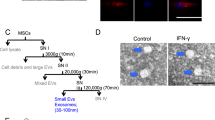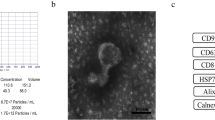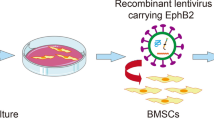Abstract
Background
Exosomes derived from bone mesenchymal stem cells (BMSCs) are potential candidates for inflammatory bowel disease (IBD) treatment. The present study investigated the therapeutic effect and potential mechanism of BMSCs-derived exosomes on pyroptosis in IBD.
Methods
We induced IBD in mice and cell models through dextran sulfate sodium (DSS) and LPS, respectively. The mRNA and protein expression levels were assessed by qRT–PCR, Western blotting, IF and IHC. The concentrations of IL-1β, IL-18 and TNFα were assessed using ELISA. ROS levels were determined using DCFH-DA staining. Cell proliferation of mIECs was analysed using an MTT assay. In addition, a flow cytometry assay was performed to detect pyroptosis. Finally, the binding relationship between miR-539-5p and NLRP3 was verified by a dual luciferase reporter gene assay.
Results
Our results revealed that intraperitoneal injection of BMSCs-derived exosomes inhibited DSS-induced pyroptosis as well as IBD symptoms in mice. In addition, BMSCs-derived exosome treatment suppressed pyroptosis, ROS levels and the concentrations of proinflammatory cytokines (IL-1β, IL-18 and TNFα) in LPS-treated mIECs in a miR-539-5p-dependent manner. Further research found that miR-539-5p suppressed NLRP3 expression in mIECs by directly targeting NLRP3. As expected, pyroptosis in LPS-treated mIECs was significantly reduced by NLRP3 knockdown. In addition, NLRP3 silencing restored the inhibitory effect of exosomes derived from BMSCs transfected with miR-539-5p inhibitor on pyroptosis in LPS-treated mIECs.
Conclusion
The present study demonstrated that BMSCs-derived exosomal miR-539-5p suppresses pyroptosis through NLRP3/caspase-1 signalling to inhibit IBD progression.






Similar content being viewed by others
Abbreviations
- IBD:
-
Inflammatory bowel disease
- UC:
-
Ulcerative colitis
- CD:
-
Crohn’s disease
- MCSs:
-
Mesenchymal stem cells
- BMSCs:
-
Bone marrow mesenchymal stem cells
- miRNAs:
-
MicroRNAs
- PYD:
-
Pyrin domain
- NLRP3:
-
Nucleotide-binding domain-like receptor family member pyrin domain-containing protein 3
- ASC:
-
Apoptosis-associated speck-like protein containing CARD
- GSDMD:
-
Gasdermin D
- ROS:
-
Reactive oxygen species
- TEM:
-
Transmission electron microscopy
- MTT:
-
3-(4,5-Dimethylthiazolyl2)-2,5-diphenyltetrazolium bromide
- qRT–PCR:
-
Quantitative real-time polymerase chain reaction
- DSS:
-
Dextran sulfate sodium salt
- TNF-α:
-
Tumour necrosis factor-α
- IL:
-
Interleukin
- LPS:
-
Lipopolysaccharide
- IF:
-
Immunofluorescence
- HE:
-
Haematoxylin–eosin
- SD:
-
Standard deviation
- ANOVA:
-
Analysis of variance
- DMELM:
-
Dulbecco's modified Eagle’s medium
- ELISA:
-
Enzyme-linked immunosorbent assay
- IHC:
-
Immunohistochemistry
References
Márquez L, Shen C, Cleynen I, De Hertogh G, Van Steen K, Machiels K, et al. Effects of haptoglobin polymorphisms and deficiency on susceptibility to inflammatory bowel disease and on severity of murine colitis. Gut. 2012;61:528–34.
Sairenji T, Collins KL, Evans DV. An update on inflammatory bowel disease. Prim Care. 2017;44:673–92.
Itzkowitz SH, Yio X. Inflammation and cancer IV Colorectal cancer in inflammatory bowel disease: the role of inflammation. Am J Physiol Gastrointest Liver Physiol. 2004;287:7–17.
Yang J, Liu XX, Fan H, Tang Q, Shou ZX, Zuo DM, et al. Extracellular vesicles derived from bone marrow mesenchymal stem cells protect against experimental colitis via attenuating colon inflammation, oxidative stress and apoptosis. PLoS ONE. 2015;10: e0140551.
Chen X, Liu G, Yuan Y, Wu G, Wang S, Yuan L. NEK7 interacts with NLRP3 to modulate the pyroptosis in inflammatory bowel disease via NF-κB signaling. Cell Death Dis. 2019;10:906.
Xiong Y, Lou Y, Su H, Fu Y, Kong J. Cholecalciterol cholesterol emulsion ameliorates experimental colitis via down-regulating the pyroptosis signaling pathway. Exp Mol Pathol. 2016;100:386–92.
Yuan YY, Xie KX, Wang SL, Yuan LW. Inflammatory caspase-related pyroptosis: mechanism, regulation and therapeutic potential for inflammatory bowel disease. Gastroenterol Rep. 2018;6:167–76.
Pelekanos RA, Li J, Gongora M, Chandrakanthan V, Scown J, Suhaimi N, et al. Comprehensive transcriptome and immunophenotype analysis of renal and cardiac MSC-like populations supports strong congruence with bone marrow MSC despite maintenance of distinct identities. Stem cell Res. 2012;8:58–73.
Weiss ML, Anderson C, Medicetty S, Seshareddy KB, Weiss RJ, VanderWerff I, et al. Immune properties of human umbilical cord Wharton’s jelly-derived cells. Stem Cells (Dayton, Ohio). 2008;26:2865–74.
Mohanty A, Polisetti N, Vemuganti GK. Immunomodulatory properties of bone marrow mesenchymal stem cells. J Biosci. 2020;45:2.
Kagia A, Tzetis M, Kanavakis E, Perrea D, Sfougataki I, Mertzanian A, et al. Therapeutic effects of mesenchymal stem cells derived from bone marrow, umbilical cord blood, and pluripotent stem cells in a mouse model of chemically induced inflammatory bowel disease. Inflammation. 2019;42:1730–40.
Park JS, Yi TG, Park JM, Han YM, Kim JH, Shin DH, et al. Therapeutic effects of mouse bone marrow-derived clonal mesenchymal stem cells in a mouse model of inflammatory bowel disease. J Clin Biochem Nutr. 2015;57:192–203.
Nakano M, Nagaishi K, Konari N, Saito Y, Chikenji T, Mizue Y, et al. Bone marrow-derived mesenchymal stem cells improve diabetes-induced cognitive impairment by exosome transfer into damaged neurons and astrocytes. Sci Rep. 2016;6:24805.
Doeppner TR, Herz J, Görgens A, Schlechter J, Ludwig AK, Radtke S, et al. Extracellular vesicles improve post-stroke neuroregeneration and prevent postischemic immunosuppression. Stem Cells Transl Med. 2015;4:1131–43.
Phinney DG, Pittenger MF. Concise review: MSC-derived exosomes for cell-free therapy. Stem Cells (Dayton, Ohio). 2017;35:851–8.
Zhang B, Shen L, Shi H, Pan Z, Wu L, Yan Y, et al. Exosomes from human umbilical cord mesenchymal stem cells: identification, purification, and biological characteristics. Stem Cells Int. 2016;2016:1929536.
Wood MJ, O’Loughlin AJ, Samira L. Exosomes and the blood-brain barrier: implications for neurological diseases. Ther Deliv. 2011;2:1095–9.
Wang G, Yuan J, Cai X, Xu Z, Wang J, Ocansey DKW, et al. HucMSC-exosomes carrying miR-326 inhibit neddylation to relieve inflammatory bowel disease in mice. Clin Transl Med. 2020;10: e113.
Sun D, Cao H, Yang L, Lin L, Hou B, Zheng W, et al. MiR-200b in heme oxygenase-1-modified bone marrow mesenchymal stem cell-derived exosomes alleviates inflammatory injury of intestinal epithelial cells by targeting high mobility group box 3. Cell Death Dis. 2020;11:480.
Meng L, Cao H, Wan C, Jiang L. MiR-539-5p alleviates sepsis-induced acute lung injury by targeting ROCK1. Folia Histochem Cytobiol. 2019;57:168–78.
Shi J, Zhao Y, Wang Y, Gao W, Ding J, Li P, et al. Inflammatory caspases are innate immune receptors for intracellular LPS. Nature. 2014;514:187–92.
Yang Y, Liu PY, Bao W, Chen SJ, Wu FS, Zhu PY. Hydrogen inhibits endometrial cancer growth via a ROS/NLRP3/caspase-1/GSDMD-mediated pyroptotic pathway. BMC Cancer. 2020;20:28.
Gaidt MM, Ebert TS, Chauhan D, Schmidt T, Schmid-Burgk JL, Rapino F, et al. Human monocytes engage an alternative inflammasome pathway. Immunity. 2016;44:833–46.
Yin Y, Wu RX, He XT, Xu XY, Wang J, Chen FM. Influences of age-related changes in mesenchymal stem cells on macrophages during in-vitro culture. Stem Cell Res Ther. 2017;8:153.
Governa P, Marchi M, Cocetta V, De Leo B, Saunders PTK, Catanzaro D, et al. Effects of Boswellia Serrata Roxb. and Curcuma longa L. in an in vitro intestinal inflammation model using immune cells and Caco-2. Pharmaceuticals. 2018;11:2.
Nunes NS, Chandran P, Sundby M, Visioli F, da Costa GF, Burks SR, et al. Therapeutic ultrasound attenuates DSS-induced colitis through the cholinergic anti-inflammatory pathway. EBioMedicine. 2019;45:495–510.
Subramanian S, Geng H, Tan XD. Cell death of intestinal epithelial cells in intestinal diseases. Sheng li xue bao : [Acta physiologica Sinica]. 2020;72:308–24.
Block GJ, Ohkouchi S, Fung F, Frenkel J, Gregory C, Pochampally R, et al. Multipotent stromal cells are activated to reduce apoptosis in part by upregulation and secretion of stanniocalcin-1. Stem Cells (Dayton, Ohio). 2009;27:670–81.
Chen TS, Lai RC, Lee MM, Choo AB, Lee CN, Lim SK. Mesenchymal stem cell secretes microparticles enriched in pre-microRNAs. Nucleic Acids Res. 2010;38:215–24.
Yang S, Liang X, Song J, Li C, Liu A, Luo Y, et al. A novel therapeutic approach for inflammatory bowel disease by exosomes derived from human umbilical cord mesenchymal stem cells to repair intestinal barrier via TSG-6. Stem Cell Res Ther. 2021;12:315.
Heidari N, Abbasi-Kenarsari H, Namaki S, Baghaei K, Zali MR, Ghaffari Khaligh S, et al. Adipose-derived mesenchymal stem cell-secreted exosome alleviates dextran sulfate sodium-induced acute colitis by Treg cell induction and inflammatory cytokine reduction. J Cell Physiol. 2021;236:5906–20.
Basu J, Ludlow JW. Exosomes for repair, regeneration and rejuvenation. Expert Opin Biol Ther. 2016;16:489–506.
Li Z, Wu G, Li J, Wang Y, Ju X, Jiang W. lncRNA CRNDE promotes the proliferation and metastasis by acting as sponge miR-539-5p to regulate POU2F1 expression in HCC. BMC Cancer. 2020;20:282.
Guo J, Cai H, Liu X, Zheng J, Liu Y, Gong W, et al. Long non-coding RNA LINC00339 stimulates glioma vasculogenic mimicry formation by regulating the miR-539-5p/TWIST1/MMPs axis. Mol Therapy Nucl Acids. 2018;10:170–86.
Mezzasoma L, Antognelli C, Talesa VN. Atrial natriuretic peptide down-regulates LPS/ATP-mediated IL-1β release by inhibiting NF-kB, NLRP3 inflammasome and caspase-1 activation in THP-1 cells. Immunol Res. 2016;64:303–12.
Shi J, Zhao Y, Wang K, Shi X, Wang Y, Huang H, et al. Cleavage of GSDMD by inflammatory caspases determines pyroptotic cell death. Nature. 2015;526:660–5.
Acknowledgements
We would like to give our sincere gratitude to the reviewers for their constructive comments.
Funding
This work was supported by Shandong Traditional Chinese Medicine Science and Technology Development Project (No. 2019-0397), Special funding sponsorship of Shandong Province Traditional Chinese Medicine High-level Talent Cultivation Project and Qilu Health Leading Talents Training Project Special Fund.
Author information
Authors and Affiliations
Corresponding author
Ethics declarations
Conflicts of interest
All authors agree with the presented findings, have contributed to the work, and declare no conflict of interest.
Ethics approval and consent to participate
The third-generation BMSCs were used for experiments. This study was approved by the The Affiliated Hospital of Qingdao University ethics committee. All animal experiments and protocols were reviewed and approved by the Animal Care and Use Committee of The Affiliated Hospital of Qingdao University.
Additional information
Responsible Editor: H. Wang.
Publisher's Note
Springer Nature remains neutral with regard to jurisdictional claims in published maps and institutional affiliations.
Rights and permissions
About this article
Cite this article
Wang, D., Xue, H., Tan, J. et al. Bone marrow mesenchymal stem cells-derived exosomes containing miR-539-5p inhibit pyroptosis through NLRP3/caspase-1 signalling to alleviate inflammatory bowel disease. Inflamm. Res. 71, 833–846 (2022). https://doi.org/10.1007/s00011-022-01577-z
Received:
Revised:
Accepted:
Published:
Issue Date:
DOI: https://doi.org/10.1007/s00011-022-01577-z




